Literary papers | Phillip Mann
Seán McMahon, Curator, Manuscripts, reviews the work of one of NZ’s most beloved theatre practitioners and science fiction writers. Mann's collection of papers, correspondence, drafts and proofs will be invaluable for the next generation of scholars.
Anthony Phillip Mann MNZM (1942–2022)
Late in 2022, one of New Zealand’s most beloved theatre practitioners and science fiction writers, Phillip Mann, passed away. Phil was renowned in the world of theatre having worked in all aspects of the profession as an actor, director, writer, producer, teacher and academic.
He was lesser known as a science fiction author here in New Zealand and had very few opportunities to attend festivals and writer’s talks. During the Going West Writers Festival in 2020 Phil commented to his interviewer David Larsen that:
Despite 40 years of writing… this was the first time I’ve ever been invited to a book festival, first time sitting at the podium talking about my books in either the UK or New Zealand.
Over those 40 years, Phil Mann’s reputation as a fiction writer has been growing, albeit slowly. Phil began donating material to the Alexander Turnbull Library in 2013. Since then, he has continued to donate his literary papers which include drafts of his stories, plays and science fiction novels.
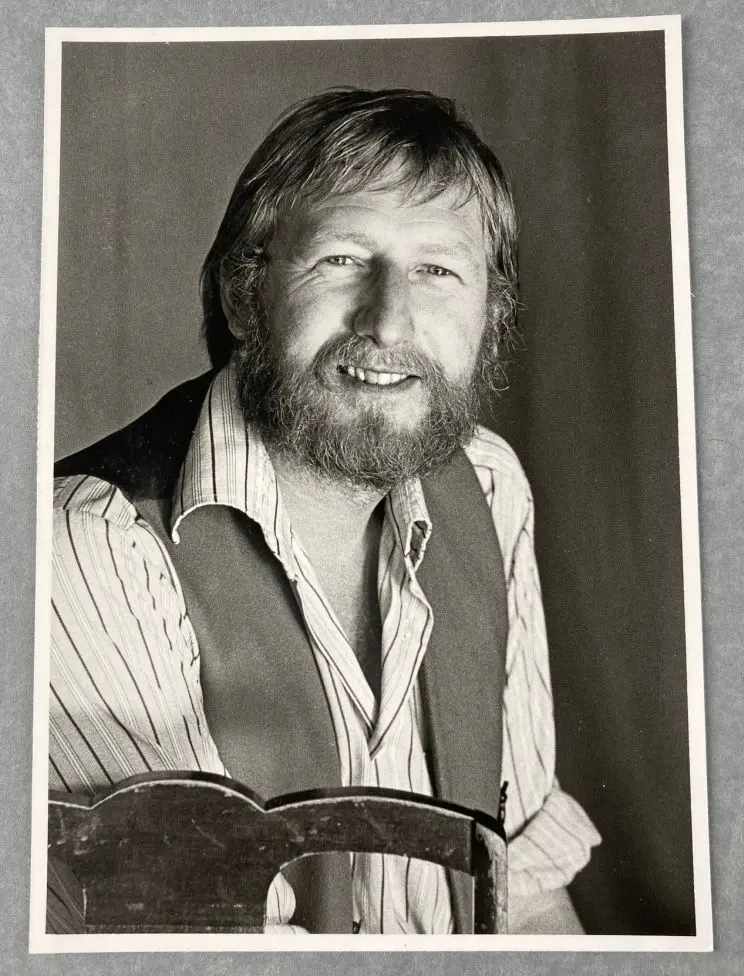
Promotional photograph of Phil taken during the 1977 production of Jean Genet’s play The Balcony. Ref: PAColl-6221. Alexander Turnbull Library.
English with a broad Yorkshire accent
Phil was originally from Yorkshire arriving in New Zealand in 1969 via a three-year stint teaching and studying in California as a newly-wedded man with his Welsh wife, Nonnita Rees. While always English with a broad Yorkshire accent, Phil considered himself a New Zealand writer in many respects having resided here for over five decades.
During his career in theatre, Phil became one of its most industrious professionals, primarily on stage and as a lecturer. In 1970 Phil was appointed the first lecturer of drama at Victoria University and went on to be the founder of the Victoria University Drama Studies Department, Wellington.
Teaching drama was one of Phil’s passions and he was an inspiration to his students. I studied under Phil in the 1980s and he had a knack for firing up his students who then wanted to rush out into the wider world to act, direct, write and just “make” theatre. A lover of the works of the German playwright and director Bertolt Brecht, Phil approached much of his teaching in a proletariat manner. He wanted all his students to be hands-on and just get in there and muck about with the drama of it all.
Teaching and directing career
While teaching at Victoria University in the 1970s and 1980s Phil was also professionally directing plays in Wellington and occasionally further afield around New Zealand. He was the Associate Director at Downstage Theatre, Wellington until 1986 and directed a series of successful productions, particularly of Brecht’s plays.
In 1981 at Downstage Theatre Phil directed the Soviet playwright and script writer Nikolai Erdman’s 1928 absurdist play Suicide. This play is regarded as Erdman’s masterpiece and deals with the theme of a fake suicide.
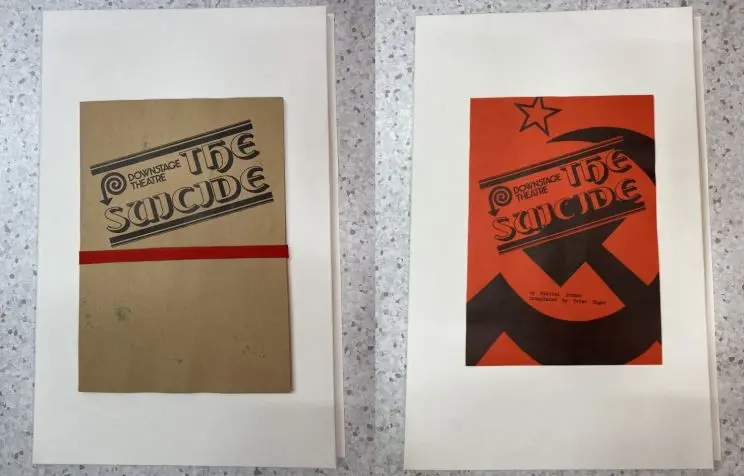
Production of The Suicide by Nicolai Erdman. Ref: MS-Papers-6791-118. Alexander Turnbull Library.
He was also the director for a range of New Zealand playwrights and the premieres of their plays. One notable example is Vincent O’Sullivan’s play Shuriken, first performed at Downstage Theatre in August 1983.
O’Sullivan’s play was based on an incident between Japanese prisoners-of-war and New Zealand POW camp staff on the 25th of February 1943. 50 Japanese soldiers died in the event at the Featherston camp.
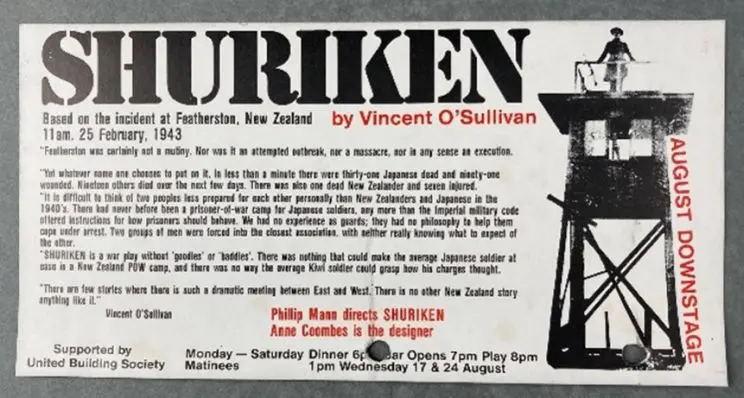
Theatre flyer for Shuriken. Ref: MS-Papers-6791-116. Alexander Turnbull Library.
Short stories and science fiction writing
What is less well-known to New Zealanders was Phil’s concurrent career as a short story writer, writer for radio, and an internationally respected science fiction writer. Phil’s radio stories and plays have been broadcast on Radio New Zealand from the 1970s to the 2000s.
His short stories were published in science fiction magazines and also broadcast on radio. In 1996 Phil was the editor of and contributor to the science fiction compilation of short stories: Tales From the Out of Time Café. The seven writers involved in this writing project were all part of the Phoenix Science Fiction Society of Wellington, including Phil.
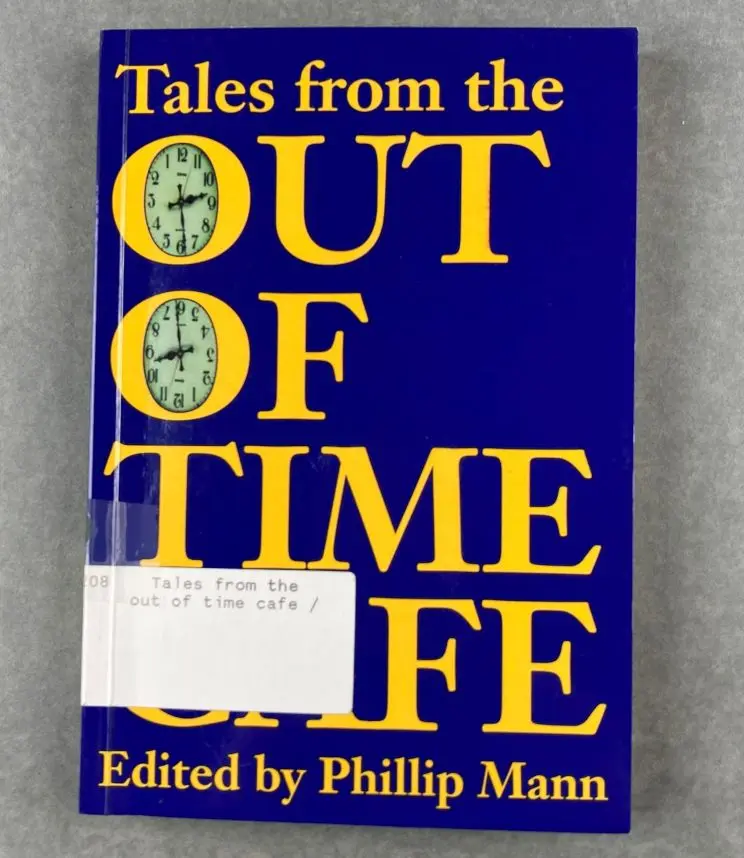
Cover of Tales From the Out of Time Café, edited by Phillip Mann.
For decades now science fiction has been overlooked in New Zealand as a serious form of fiction writing. Whilst a popular form of writing for readers, the focus of awards, funding, support, and publishing is more focused on literary fiction, poetry, playwriting, and children’s writing than science fiction work. These reasons explain why Phil is not more well-known here for his writing in this genre, sometimes referred to as speculative fiction.
Phil first became interested in the world of science fiction in childhood. Not long after arriving in New Zealand, he began to take seriously the writing of science fiction stories. Phil wrote in his spare time after attending to his theatre activities, academic teaching and raising a young family of two children.
The Eye of the Queen
From 1977 to 1979, Phil and his wife Nonnita worked as sub-editors for the New China News Agency in China when Phil began to work seriously on his first novel, The Eye of the Queen, which was eventually published by Gollancz in London, in 1982.
At the time Gollancz was one of the largest publishing houses in the world of science fiction, publishing internationally acclaimed authors like George Orwell, Arthur C. Clarke, and Terry Pratchett.
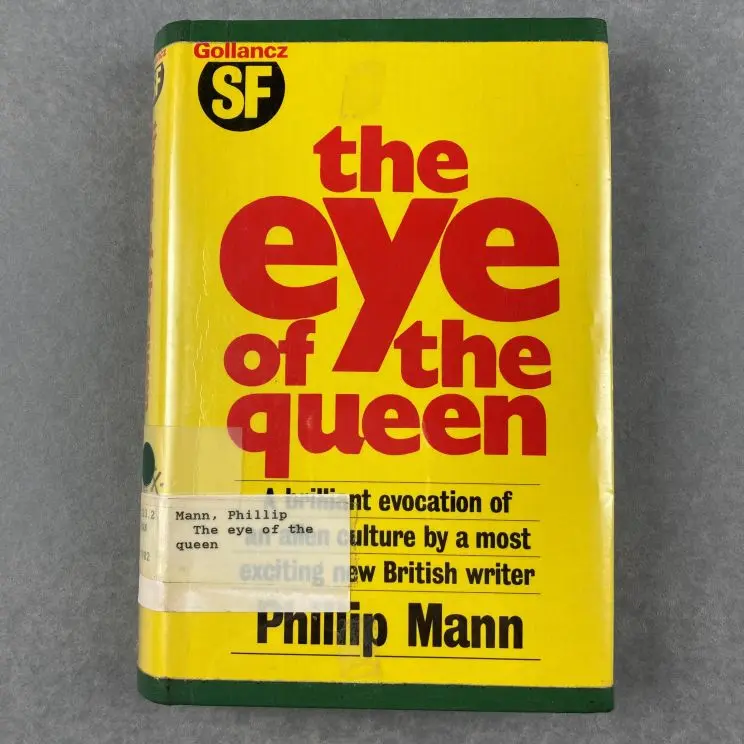
Cover for the first edition of Eye of the Queen, published by Gollancz, 1982.
The publisher’s blurb from one of the editions of the Eye of the Queen commented:
Marius Thorndyke, the legendary contact linguist, willingly came out of retirement to meet with the Pe-Ellinas when they asked for him. And he willingly returned to Pe-Ellia at their request. He was a veteran of contacts with alien species, but they had always been technologically inferior to Earth. The Pe-Ellians were different. Humanoid but twice the height of humans and sexless, they clearly came from a very advanced civilization: a civilization that understood the power of thought.
The Eye of the Queen was very well received and reviewed by critics in the United Kingdom, and this spurred Phil on in his science fiction writing. In a flurry, four more novels were written between 1986 and 1990: The Master of Paxwax, The Fall of the Families, Pioneers, and Wulfsyam – A Mosaic. As if taking a break to regather his forces there were no more publications until 1993 which saw a quartet of novels in the A Land Fit for Heroes series published over four years until 1996.
A change in publishing personnel at Gollancz saw Phil falling out of favour as one of their stable authors. He continued to write however working as a full-time writer and freelance director from 1998 until 2022. In 2013 Phil’s original editor at Gollancz had thought Phil to be dead. Upon discovering he was very much alive he asked if Phil had been working on any further science fiction work. He had. That novel was The Disestablishment of Paradise and was published in the same year.
Never short on ideas Phil kept on writing even when he suffered ill health later in life. His eleventh and last novel Chevalier & Gawayn: The Ballad of the Dreamer was published in 2022 by New Zealand publisher Quentin Wilson Publishing.
Phil’s novels have been published in foreign languages, particularly German. He has made the following comment on his science fiction writing:
Thinking about alien consciousness helps clarify my thinking about Earth and the way we conduct ourselves. Thus, I think of my books as being about us, no matter how outlandish the scenario.
His novels cover environmental, political, moral, and social themes and are still very contemporary today.
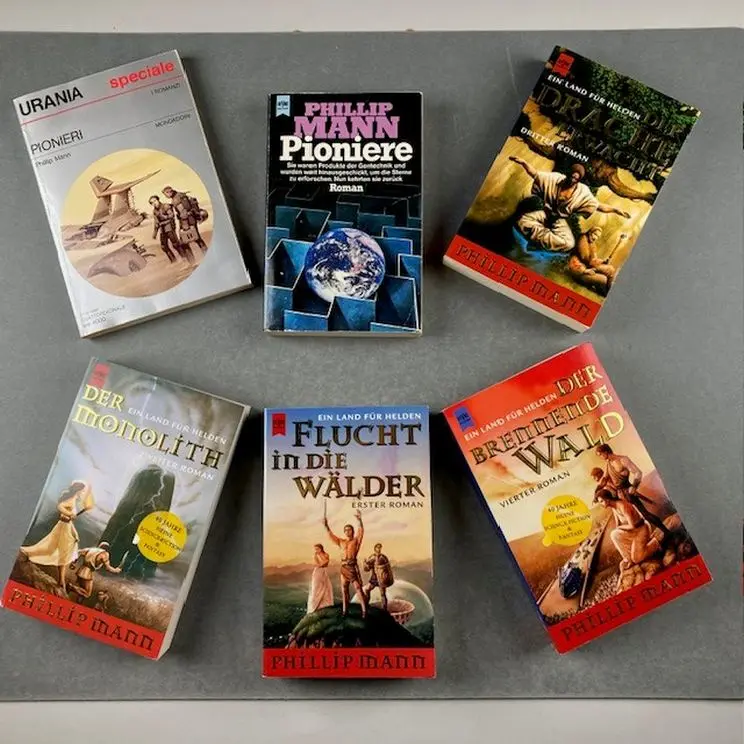
Covers of six of Phillip Mann’s foreign publications.
Phillip Mann’s papers at the Library
In his papers, there are series relating to his drama productions, workshops, and lectures. Further material includes literary and personal correspondence. A challenge with this collection was the donated electronic material which included email.
An early adopter of technology, Phil’s writing was written on the first generations of personal computers. The Library’s digital archivists have been busy migrating files from old floppy disks and hard drives onto our electronic servers so this material can be made available to researchers in our reading rooms now and in the future.
Phillip Mann papers (MS-Group-0896)
An example of corrected proofs from one of Phil’s favourite novels Wulfsyarn, a mosaic. Ref: MS-Papers-6791-045. Alexander Turnbull Library.
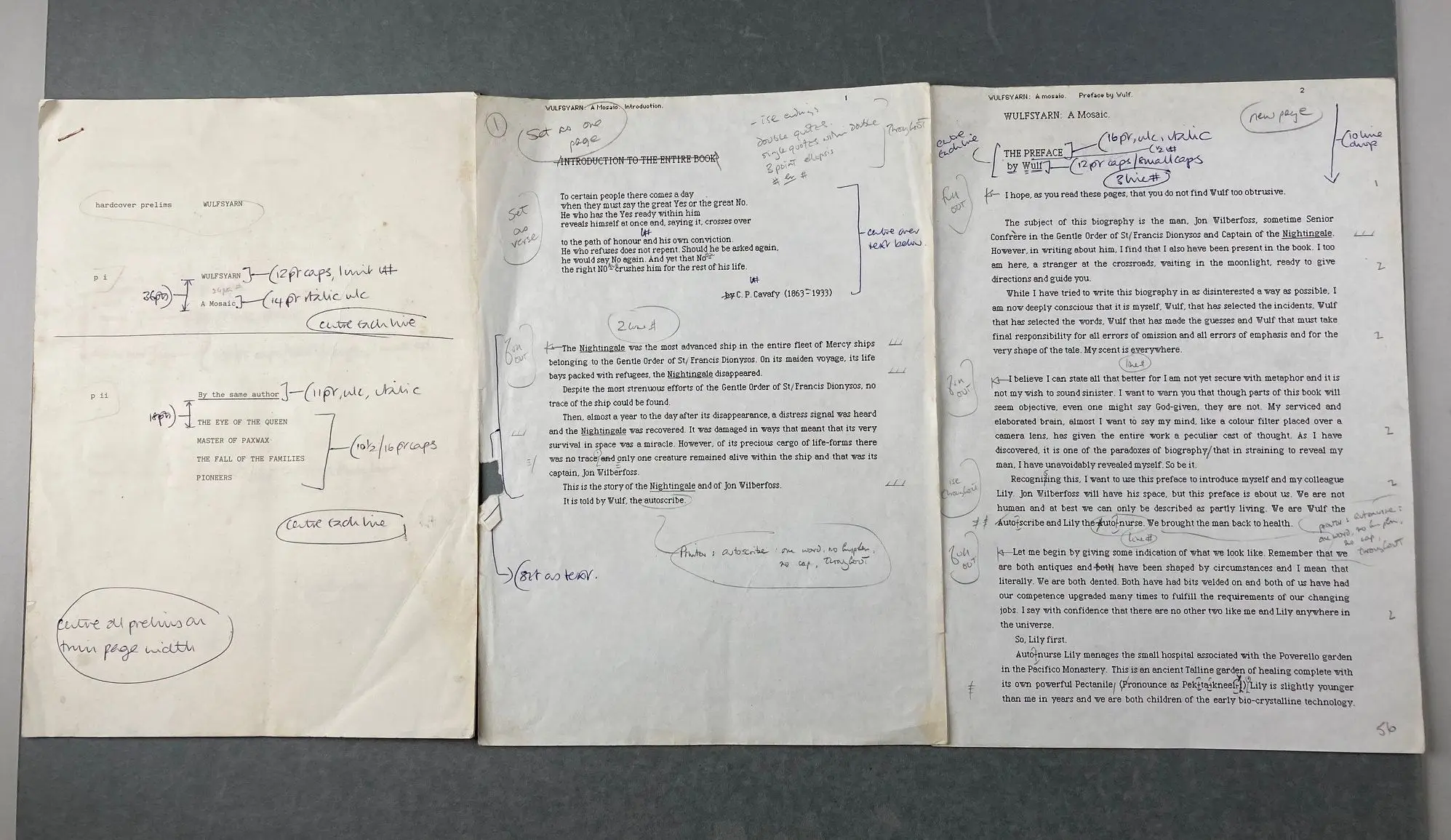
Phil Mann’s website
For many years, Phil kept a website on WordPress where he updated his readers on his thoughts and writing activities. The National Library has periodically harvested this site and his blog which will be kept for perpetuity in the Library collections.
Archived copy of Phil Mann’s website
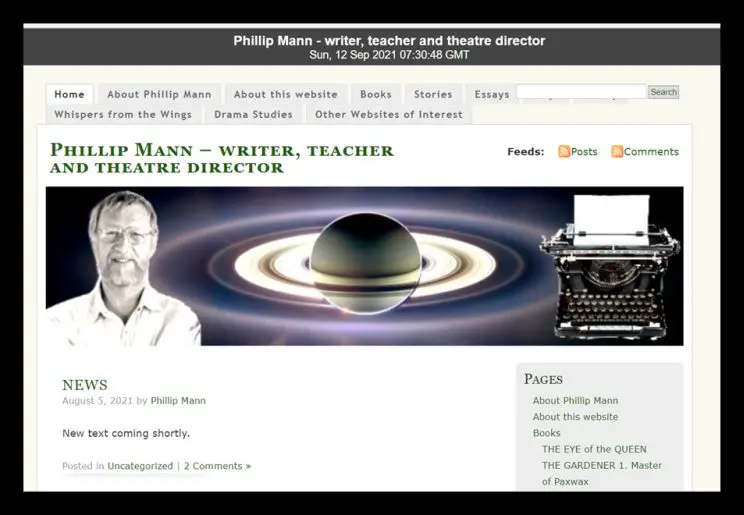
Website homepage for Phillip Mann: writer, teacher, and theatre director
Chevalier & Gawayn: The Ballad of the Dreamer
In his blog in October 2015, there is an entry for the novel The Head Man which eventually became his final novel Chevalier & Gawayn: The Ballad of the Dreamer. Here Phil talks about his experience of writing:
I am at a turning point in a new novel called The Head Man. If a turning point can be likened to a bend in the road, it means that I cannot clearly see the ending yet. I expect surprises, for this novel has had many surprises for me, not least the following short poem.
I was writing about the death of a character called Hazel. She was the beloved of Sir Gawayn – yes, him of the Green Knight story – and he, faithful but faithless too, returned too late to save her. Standing at her grave side, Gawayn saw the following short poem which, in its own way, is a summary of the entire book… to which I must now return.
For HAZEL
Spare a thought for Hazel,
Who lies beneath this stone,
Who loved a man, who rode away,
And n’er came riding home.
*
She loved too well, not wisely,
And love can be a thief.
The golden coin it steals is joy,
The change it leaves is grief.
*
But yet, if Hazel woke up now,
With smiling lips she’d say,
”Not to love is not to live,
No matter the price we pay.
No act of love is ever lost.
We count the joy, not the cost,
For lovers do what lovers must,”
*
These are the words she’d say.
She’d say, “Not to love is not to live,
No matter the price we pay.”’
Phil’s output as a writer was astonishing when taking into consideration his other careers as a professional theatre director, university academic and teacher. Phil received the Sir Julius Vogel Award for services to Science Fiction in 2010. In 2015 Phil was awarded an Honorary Literary Fellow by the New Zealand Society of Authors, and in 2017 he was awarded membership of the New Zealand Order of Merit for his services to theatre and literature.
We are fortunate that Phil donated his collection to the Turnbull Library for theatre researchers and science fiction students. It will be a lasting legacy for the next generation of New Zealand writers and scholars.
Talks, lectures and workshops on theatre and science fiction
If you are studying theatre then Phil’s papers (MS-Group-0896) will provide background for some of the theatre productions he worked on. The following image is a sketch for the stage design for the play With Hard Labour: The Case of Alice Parkinson, by Carol Markwell which Phil and Jo Kahl directed at the Suter Gallery Theatre, Nelson in 1995.
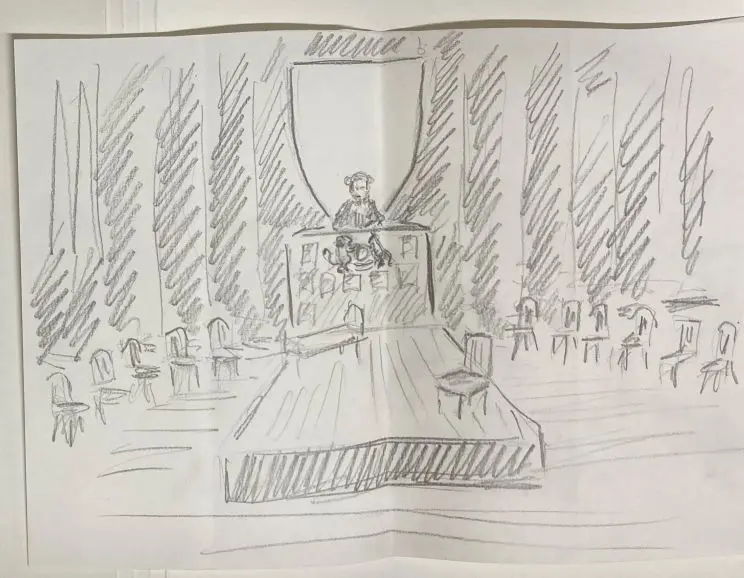
Papers relating to the play With Hard Labour: The Case of Alice Parkinson. Ref: MS-Papers-11512-11. Alexander Turnbull Library.
There are also manuscripts relating to his talks, lectures, and workshops on both theatre and science fiction. In 1989 Phil gave a series of four lectures on science fiction for the adult education programme, at the Victoria University of Wellington Centre for Continuing Education called The Gathering of Aliens.
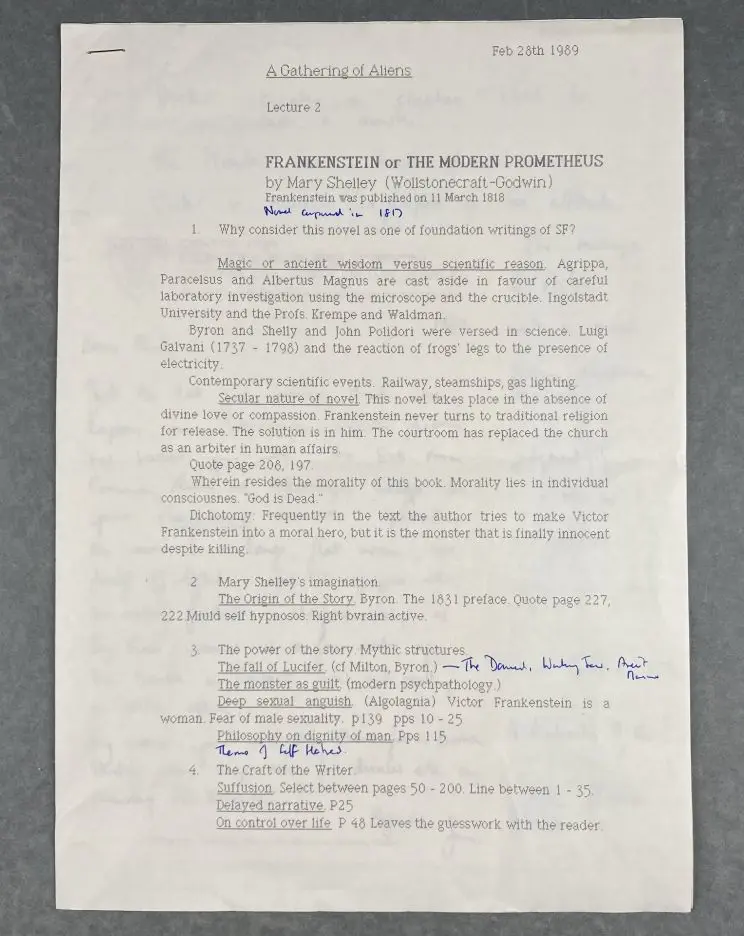
Outline for Lecture Two, A gathering of aliens (lecture series). Ref: MS-Papers-6791-132. Alexander Turnbull Library.
Further reading and resources on Phil Mann
Theatre collections at the Library
The Library holds many collections relating to theatre in New Zealand and a number of these papers have links to Phil’s works.
Downstage Theatre Company Inc: Records (ATL-Group-00682)
Playmarket Inc: Records (MS-Group-0965)
Circa Theatre — Posters, 1976 onwards (Eph-C-CIRCA)
Depot Theatre (Wellington) — Posters for productions, 1987 (Eph-D-DEPOT-1987)
Mann, Phillip, 1942- : Sound recording (OHColl-1097)
The Player Kings oral history project (OHColl-0795)
Ashton, John Hammond, 1917-2010: Negatives (PA-Group-00381)
Marsh, Ngaio (Dame), 1895-1982: Papers (MS-Papers-1397)
Science fiction collections at the Library
Our holdings relating directly to the genre of science fiction writing are sparse. Some interesting links to science fiction in general at the Library are below.
Wallis, Redmond Frankton, 1933-2006: Papers (MS-Group-1201)
Johnson, Stephanie, 1961- : Literary papers (MS-Group-1077)
Lecture notes - Science fiction, Michael Kennedy Joseph (MS-Papers-6678-080)
Hollis, David, 1945- : Navian (MSX-5972)
Miscellaneous papers, Lauris Edmond (MS-Papers-6912-158)
McEldowney, Richard Dennis: Miscellaneous writings (MS-Papers-7777-244)
Doyle, Martin, 1956- :[Sir Julius Vogel]. 1 August 2012, Cartoon, ‘New Zealand's first science fiction novel’ (DCDL-0022532)
Body Art Rocks, “Galactic voyage”, 17 November, Paramount Theatre [2006]. Ephemera (Eph-D-COSMETICS-2006-01)
Further resources
Interview with Phillip Mann talks about Chevalier & Gawayn — NZ Booklovers website
Transcript of Phil Mann interview by John Davidson — retired Professor of Classics at Victoria University of Wellington, recorded in Wellington on 21st October 2016
NZ author & theatre director Phillip Mann has passed — Wellington City Libraries blog
Phillip Mann and Ecological Sci-Fi — Going West Writers Festival
The Disestablishment of Paradise — An Interview with Phillip Mann — GOLLANCZ website
Phil Mann tribute by David Geary — Toi Whakaari New Zealand Drama School
James Shaw on sci-fi master Phil Mann — Newsroom
Phil Mann — Encyclopedia of Science Fiction
Wulfsyarn: A mosaic by Phillip Mann — RNZ's The Reading
Literary Papers blog series
The Literary Papers blog series highlights collection items from the Manuscripts Collection at the Alexander Turnbull Library.
I knew Phill since the mid 1950s as I went to school and acted with him. Phils' acting was fueled by Peter Burton our English teacher at school in Scarborough, Yorkshire, England. He was a bit of a revolutionary then and produced a small slightly revolutionary 'magazine' called 'Bomb blast' to which I contributed before the school 'shut it down'. I have a copy somewhere. Phil was a 'fast' bowler though due to his eyesite, inaccurate. There are many funny stories about our school life where I was a boarder and he a day boy.